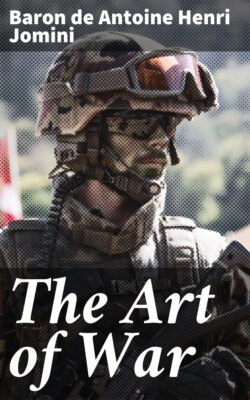Читать книгу The Art of War - baron de Antoine Henri Jomini - Страница 35
На сайте Литреса книга снята с продажи.
Other Causes which exercise an Influence upon the Success of a War.
ОглавлениеTable of Contents
As the excited passions of a people are of themselves always a powerful enemy, both the general and his government should use their best efforts to allay them. We have nothing to add to what has been said on this point under the head of national wars.
On the other hand, the general should do every thing to electrify his own soldiers, and to impart to them the same enthusiasm which he endeavors to repress in his adversaries. All armies are alike susceptible of this spirit: the springs of action and means, only, vary with the national character. Military eloquence is one means, and has been the subject of many a treatise. The proclamations of Napoleon and of Paskevitch, the addresses of the ancients to their soldiers, and those of Suwaroff to men of still greater simplicity, are models of their different kinds. The eloquence of the Spanish Juntas, and the miracles of the Madonna del Pilar, led to the same results by very different means. In general, a cherished cause, and a general who inspires confidence by previous success, are powerful means of electrifying an army and conducing to victory. Some dispute the advantages of this enthusiasm, and prefer imperturbable coolness in battle. Both have unmistakable advantages and disadvantages. Enthusiasm impels to the performance of great actions: the difficulty is in maintaining it constantly; and, when discouragement succeeds it, disorder easily results.
The greater or less activity and boldness of the commanders of the armies are elements of success or failure, which cannot be submitted to rules. A cabinet and a commander ought to consider the intrinsic value of their troops, and that resulting from their organization as compared with that of the enemy. A Russian general, commanding the most solidly organized troops in Europe, need not fear to undertake any thing against undisciplined and unorganized troops in an open country, however brave may be its individuals.[1] Concert in action makes strength; order produces this concert, and discipline insures order; and without discipline and order no success is possible. The Russian general would not be so bold before European troops having the same instruction and nearly the same discipline as his own. Finally, a general may attempt with a Mack as his antagonist what it would be madness to do with a Napoleon.
The action of a cabinet in reference to the control of armies influences the boldness of their operations. A general whose genius and hands are tied by an Aulic council five hundred miles distant cannot be a match for one who has liberty of action, other things being equal.
As to superiority in skill, it is one of the most certain pledges of victory, all other things being equal. It is true that great generals have often been beaten by inferior ones; but an exception does not make a rule. An order misunderstood, a fortuitous event, may throw into the hands of the enemy all the chances of success which a skillful general had prepared for himself by his maneuvers. But these are risks which cannot be foreseen nor avoided. Would it be fair on that account to deny the influence of science and principles in ordinary affairs? This risk even proves the triumph of the principles, for it happens that they are applied accidentally by the army against which it was intended to apply them, and are the cause of its success. But, in admitting this truth, it may be said that it is an argument against science; this objection is not well founded, for a general's science consists in providing for his side all the chances possible to be foreseen, and of course cannot extend to the caprices of destiny. Even if the number of battles gained by skillful maneuvers did not exceed the number due to accident, it would not invalidate my assertion.
If the skill of a general is one of the surest elements of victory, it will readily be seen that the judicious selection of generals is one of the most delicate points in the science of government and one of the most essential parts of the military policy of a state. Unfortunately, this choice is influenced by so many petty passions, that chance, rank, age, favor, party spirit, jealousy, will have as much to do with it as the public interest and justice. This subject is so important that we will devote to it a separate article.
FOOTNOTES:
[1]
Irregular troops supported by disciplined troops may be of the greatest value, in destroying convoys, intercepting communication, &c., and may—as in the case of the French in 1812—make a retreat very disastrous.
